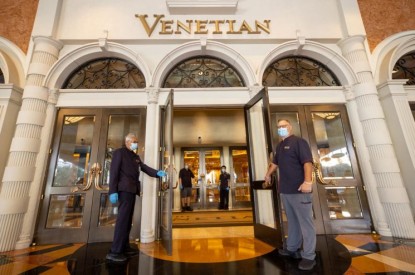Operator News
US – Nevada Gaming Fact Book outlines devastation of pandemic on resort sector
By Phil - 11 March 2021
The publication of the Nevada Gaming Fact Book has told its own story of the ‘devastating’ effects that the COVID-19 pandemic has wreaked on Nevada’s resort industry although its publishers the Nevada Resort Association are optimistic for the future.
From employment rates and tax revenues to visitor volumes and total revenues, all the key economic indicators driven by Nevada’s resort industry plummeted in 2020 due to the ongoing COVID-19 pandemic, according to the Nevada Resort Association’s 2021 Nevada Gaming Fact Book.
Published every two years, the Nevada Gaming Fact Book provides a comprehensive look into the contributions of the state’s economic engine through employment, wages and benefits, investment dollars, tax revenue and corporate social responsibility programs, among other economic data. The Resort Association retained Applied Analysis, a Nevada-based economic research and analysis firm, to compile the data and produce the report which features a new format this year.
The report illustrates the severity of the economic fallout from the COVID-19 pandemic and its
impact on Nevada’s tourism and hospitality industry over the past year. Total employment in the leisure and hospitality sector stands at 300,700, the equivalent to
2010 levels (as of Dec. 2020). Industry-specific taxes dropped 29 per cent in fiscal year 2020 and are down 60.4 percent for
the first half of calendar year 2020 compared to the prior year. Total revenue (gaming and nongaming) is down 25.2 per cent from the prior fiscal year. Gross gaming revenue is down 21.7 per cent from the prior fiscal year. Statewide visitation is down 24.6 percent from the prior fiscal year.
“2020 was an unimaginable year for Nevadans when the state’s primary industry came to a standstill,” said Ellen Whittemore, Chair of the Nevada Resort Association’s Board of Directors and Wynn Resorts Executive Vice President and General Counsel. “Thousands of employees lost their jobs and small businesses dependent on tourism closed as business and leisure travel evaporated. Tax revenues from the resort industry plummeted, negatively affecting funding for critical state and local services. No state was hit harder by the economic ramifications of the pandemic than Nevada.”
As of the end of fiscal year 2020, the resort industry contributed 33.8 per cent of the state’s general fund revenue and generated $1.3bn in industry-specific fees and taxes for the state. It accounted for 23.8 per cent of total employment in the state.
“Despite the difficult year and ongoing impacts of the pandemic, Nevada’s resort industry remains responsive, resilient and adaptive,” said Whittemore. “As the economic lifeblood of this state and largest employment sector, the resort industry is doing all it can to help Nevada’s economy recover and to bring more people back to work as soon as possible.”
Virginia Valentine, President of the Nevada Resort Association, added: “While the road to full recovery will take time, there are many reasons to be optimistic about the days ahead. Vaccinations are happening, and available supply of available vaccines continues to grow. The current health metrics continue to decline, and capacity limitations for businesses are being eased. There are encouraging signs in consumers’ readiness to travel, and we know there is a pent-up demand from business and leisure travelers to return to Nevada.”
In addition, the report includes statewide tourism indicators and trends, a detailed breakdown of many business taxes levied on the industry, employment facts with wage and salary impacts and a summary of major tourism-related capital projects currently underway or planned in northern and southern Nevada, which total an estimated $15.5bn. Hotel-casino companies continue to be the state’s largest property taxpayers, holding eight of the top ten spots of the highest appraised
taxpayers in Clark County and four of the top ten spots in Washoe County.
The report concludes with a brief overview of the resort industry’s COVID-19 relief efforts, its commitment to employees during the crisis and insight into members’ corporate social responsibility programs. For example, members of the industry provided pay and health benefits during the 78-day closure and established employee emergency funds, providing millions of dollars in grants to help employees pay mortgage and rent payments, utilities and medical bills. The industry donated more than 1.1 million pounds of food to local nonprofits in northern and southern Nevada as the industry closed in March and have provided critical supplies and personal protective equipment (PPE), including more than 12.5 million masks and face coverings, to law enforcement, hospitals, community organizations and nonprofits.


